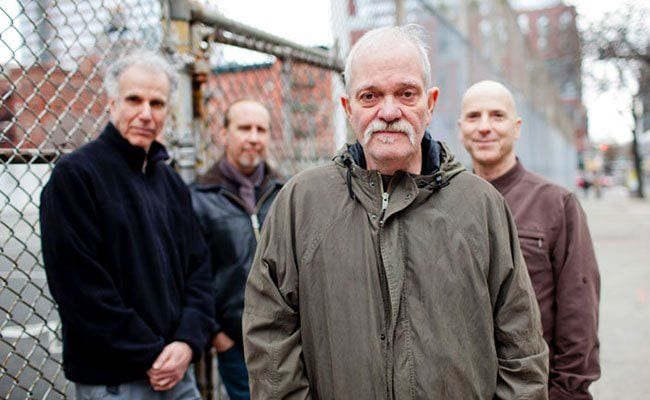
It has been a busy season for jazz guitarists of a certain school, specifically the atmospheric/melodic kind of guitarist who has thrived on ECM Records for many years. Ralph Towner just released a tasty solo acoustic disc, and relative newcomer Wolfgang Muthspiel triumphed with 2016’s Rising Grace, where he channeled Pat Metheny and the ECM pioneer John Abercrombie in various ways.
Now Abercrombie has a new one on ECM using his working quartet with Marc Copland on piano, Drew Gress on bass and drummer Joey Baron. It can be heard as a successor to 39 Steps, recorded in 2013 with the same band, but it might also be heard in connection with the continued excellent work of Abercrombie’s ECM six-string associates.
Abercrombie has always been among the most important and curious jazz guitarists since jazz got truly electrified in the late 1960s. He was in the early wave of Berklee graduates and also the early wave of jazz-rock fusion players: with the band Dreams (featuring drummer Billy Cobham and both Michael and Randy Brecker), with Chico Hamilton’s touring band, and on some of the funky, early Cobham recordings such as Total Eclipse. Even his first ECM recording pointed in this fusion-y direction. The lit-afire and widely acclaimed Timeless was built around throbbing synth bass lines from Jan Hammer, and it is one of the label’s (and fusion’s) early masterpieces.
But most of Abercrombie’s career went in a different, more varied and gentle direction. Even on Timeless the fusion playing was leavened with acoustic exploration and ballad playing. Abercrombie’s electric attack stung with a muted quality even when it was loud. In fact, his next ECM record, Gateway, with Jack DeJohnette and Dave Holland, was more avant-garde and more visceral in every way. Even as it leaned closer to pure “jazz”.
Eventually, Abercrombie could be seen as an early exponent of a particularly “ECM” guitar approach: atmospheric, lightly processed but ultimately not rock-ish. He came before Metheny, and he seems as important an influence on younger players such as Ben Monder, too. His influence, in the end, was not in how he raged but how he listened to bandmates, how he made them better.
Today, his most satisfying work comes in a relatively traditional form: a jazz quartet with piano trio plus guitar. On this new disc, his playing is immediately recognizable, gorgeous and languid, but with a warm ring that isn’t all that different from Wes Montgomery or Grant Green. The work on Up and Coming (ironic, I imagine purposefully, for a musician who is now 72 and long established as a master) is not busting boundaries. But it is excellent.
The connection between Abercrombie and pianist Marc Copland goes back to the days when they both played for Chico Hamilton (when Copland was still mainly a saxophonist), but it is temperamental as well as longstanding. They are both patient explorers of the sonic space who excel on ballads. “Tears” is an impressionistic tune in a minor key that uses both a steady set of quarter chords from Copland’s left hand and beautiful brushwork from Barron to set up a slow and rising melody from Abercrombie’s single note approach and Copland’s chordal right hand. Those left-band quarter notes don’t make it plodding, and Copland eventually loosens his grip as Abercrombie and Gress improvise. ’Tis breathtaking.
“Up and Coming” begins with just guitar and piano in duet, and the sympathetic voicings and sonorities work perfectly. Though Copland takes the first solo, Abercrombie’s accompaniment consists of a quiet line of counterpoint rather than chords. Even the interchange between their solos is a kind of middle ground of quiet exchange. Not that they overlap, exactly, but it’s as if the piano and guitar are always looking out for each other, never in battle, always creating an open space.
If there’s one real classic here, it may be in the stunning version of “Nardis”, the Miles Davis tune that was perfected by the Bill Evans Trio during the 1960s. The modal space of this tune, sounds like the sonic embodiment of mystery, and both piano and guitar are free to explore the harmonic space with a sense of adventure. Barron is fantastic here, using his cymbals to fragment the rhythmic flow in exciting ways. Hearing this version will send you back to Evans and his recordings, laying bare another of Abercrombie’s influences.
The downside to this kind of music, perhaps, is proper politeness that seems soft over the course of a full album. “Sunday School” cries out to be referred to as “chamber jazz” — lovely but so filigreed at times that it will cloy at some ears. Copland and Abercrombie both phrase beautifully here, and blues tonality runs across the melody. But when put on the same program with “Joy” (a very slow and gorgeous piece of atmosphere) and “Jumbles” (a lovely, melancholy tune that kicks up some dust but in the most polite way), “Sunday School” starts to seem like too much icing, not enough cake.
I prefer the band when it is more in the pocket, such as on “Silver Circle”, where the opening is a percolating stew that might just owe something to Bitches Brew … or to Abercrombie’s Timeless, though mostly acoustic. The way this song tap-steps through polyrhythms and then dynamically develops actually qualifies as exciting. It’s good to have a some adrenaline on a gorgeous ECM recording, too!

